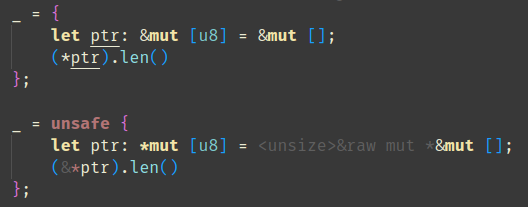feat: Add an option to hide adjustment hints outside of `unsafe` blocks and functions
As the title suggests: this PR adds an option (namely `rust-analyzer.inlayHints.expressionAdjustmentHints.hideOutsideUnsafe`) that allows to hide adjustment hints outside of `unsafe` blocks and functions:

Requested by `@BoxyUwU` <3
Improve goto declaration
Closes https://github.com/rust-lang/rust-analyzer/issues/13599
- goto decl now goes to assoc items of trait declarations over the items of trait implementations
- goto decl now goes to the field declaration (opposed to goto def which shows both the field decl and binding created/local being used)
- also adds back the goto definition fallback that seems to have been dropped at some point.
scip: Generate symbols for local crates.
Consider something like:
```
// a.rs
pub struct Foo { .. } // Foo is "local 1"
fn something() {
crate:🅱️:Bar::new() // Bar is "local 1", but of "b.rs"
}
// b.rs
pub struct Bar { .. } // "local 1"
```
Without this there's no way to disambiguate whether "local 1" references "Bar" or "Foo".
The reason for that was that we were calculating the crate defmaps
of the file we are saving by accident causing us to get stuck waiting
on their expensive computation, while we only need the relevant crate
id.
feat: Display the value of enum variant on hover
fixes#12955
This PR adds const eval support for enums, as well as showing their value on hover, just as consts currently have.
I developed these two things at the same time, but I've realized now that they are separate. However since the hover is just a 10 line change (not including tests), I figured I may as well put them in the same PR. Though if you want them split up into "enum const eval support" and "show enum variant value on hover", I think that's reasonable too.
Since this adds const eval support for enums this also allows consts that reference enums to have their values computed now too.
The const evaluation itself is quite rudimentary, it doesn't keep track of the actual type of the enum, but it turns out that Rust doesn't actually either, and `E::A as u8` is valid regardless of the `repr` on `E`.
It also doesn't really care about what expression the enum variant contains, it could for example be a string, despite that not being allowed, but I guess it's up to the `cargo check` diagnostics to inform of such issues anyway?
Allow configuration of annotation location.
I've added the ability to configure where lens annotations render relevant to the item they describe. Previously, these would render directly above the line the item is declared on. Now, there is the ability to render these annotations above the entire item (including doc comments, and attributes).
The names of the config options are up for debate, I did what seemed best to me but if anyone has better ideas let me know.
This is my first contribution so if I've missed anything please let me know.
Here's a preview of what the new option looks like:
<img width="577" alt="Screen Shot 2022-09-11 at 10 39 51 PM" src="https://user-images.githubusercontent.com/33100798/189570298-b4fcbf9c-ee49-4b79-aae6-1037ae4f26af.png">
closes https://github.com/rust-lang/rust-analyzer/issues/13218
fix: handle lifetime variables in projection normalization
Fixes#12674
The problem is that we've been skipping the binders of normalized projections assuming they should be empty, but the assumption is unfortunately wrong. We may get back lifetime variables and should handle them before returning them as normalized projections. For those who are curious why we get those even though we treat all lifetimes as 'static, [this comment in chalk](d875af0ff1/chalk-solve/src/infer/unify.rs (L888-L908)) may be interesting.
I thought using `InferenceTable` would be cleaner than the other ways as it already has the methods for canonicalization, normalizing projection, and resolving variables, so moved goal building and trait solving logic to a new `HirDatabase` query. I made it transparent query as the query itself doesn't do much work but the eventual call to `HirDatabase::trait_solve_query()` does.
Previously, annotations would only appear above the name of an item (function signature, struct declaration, etc).
Now, rust-analyzer can be configured to show annotations either above the name or above the whole item (including doc comments and attributes).